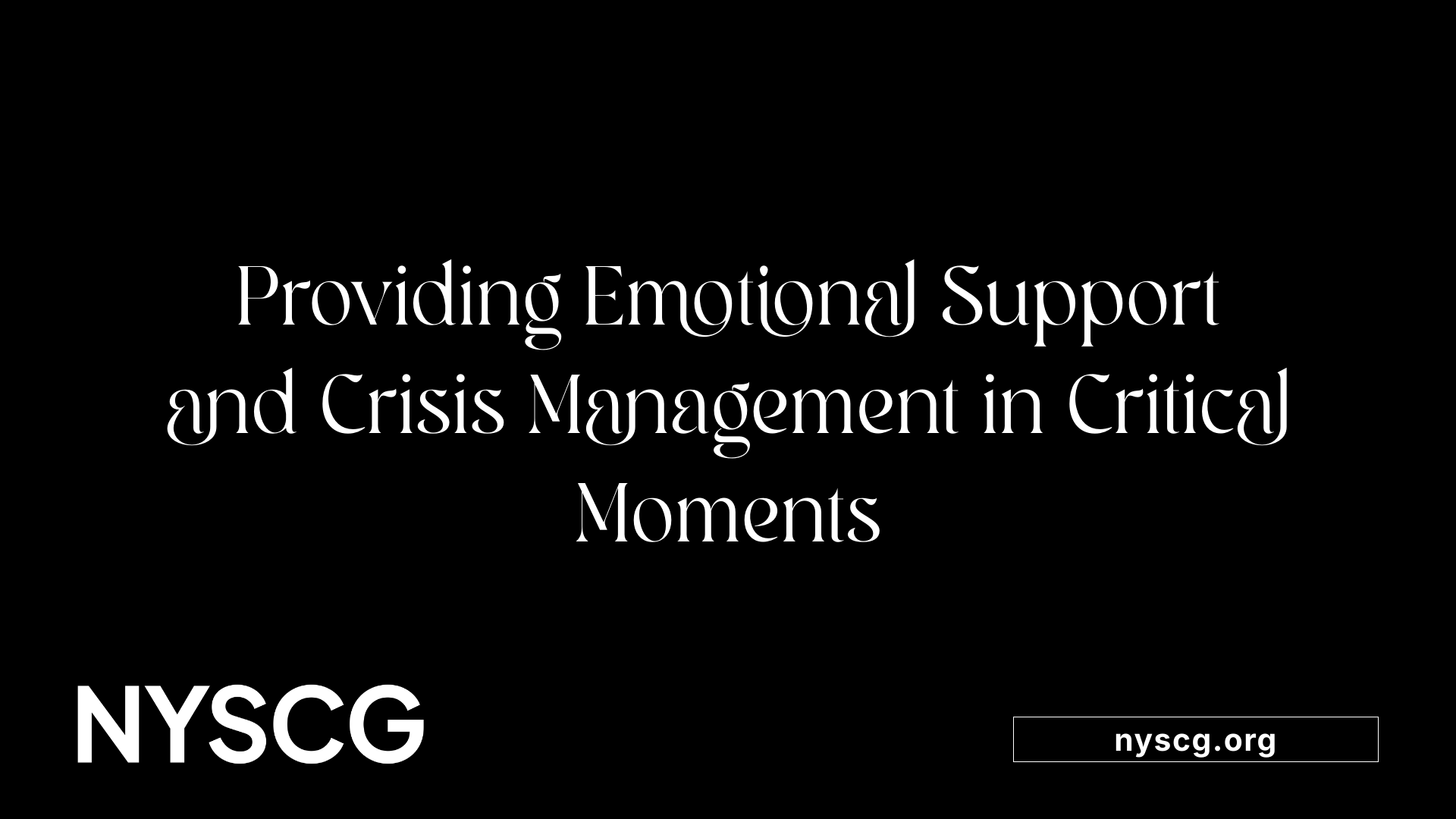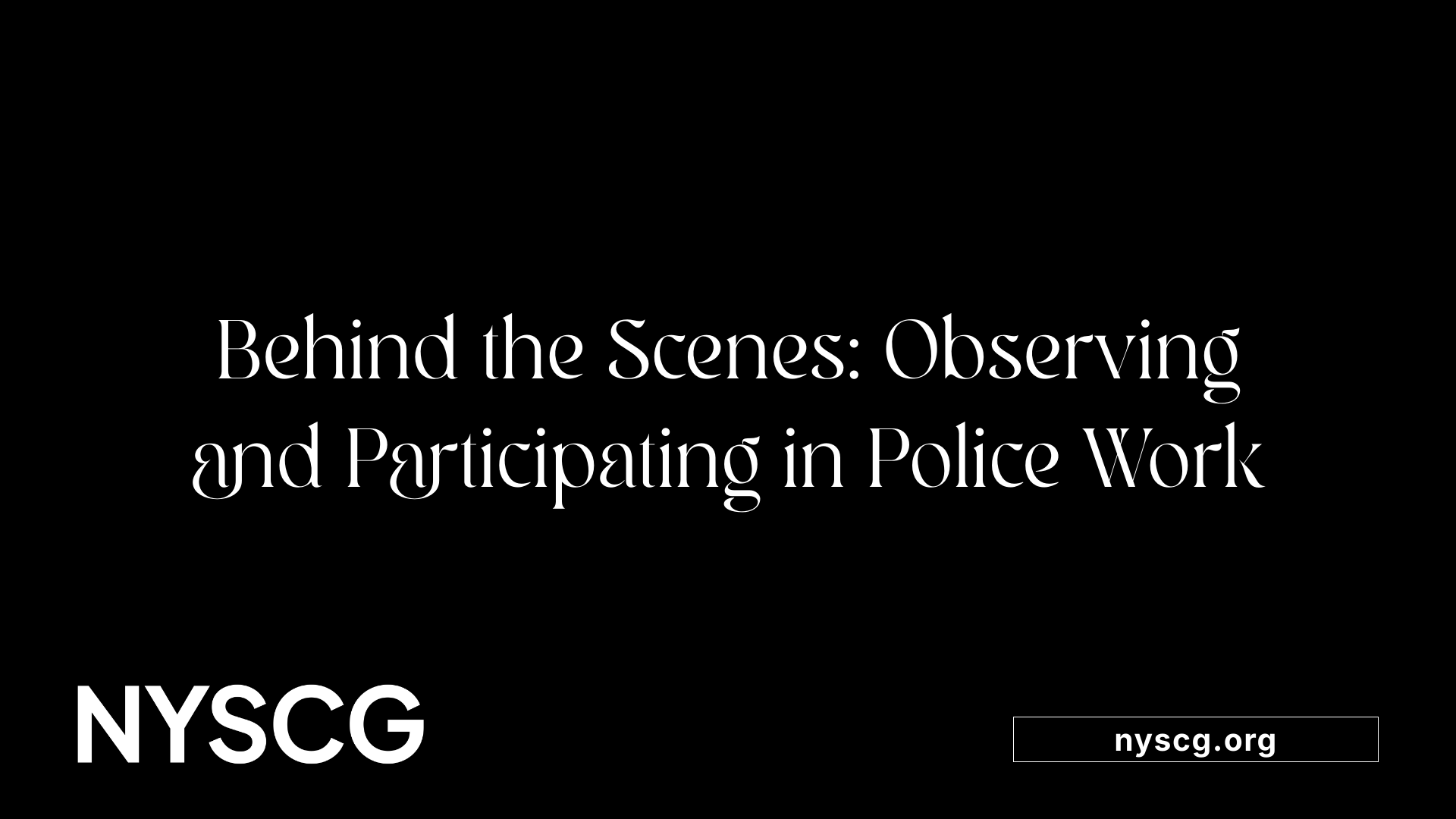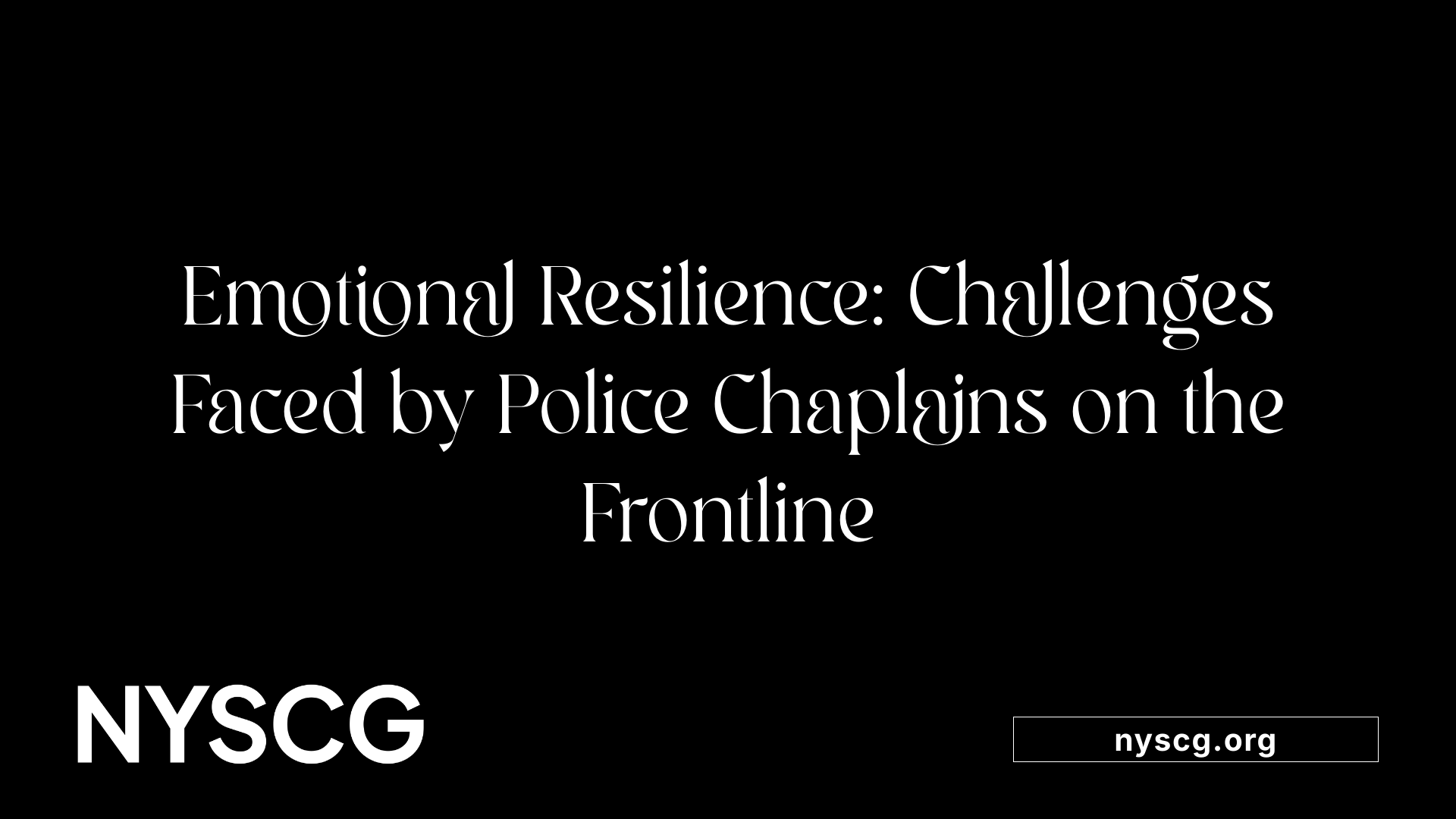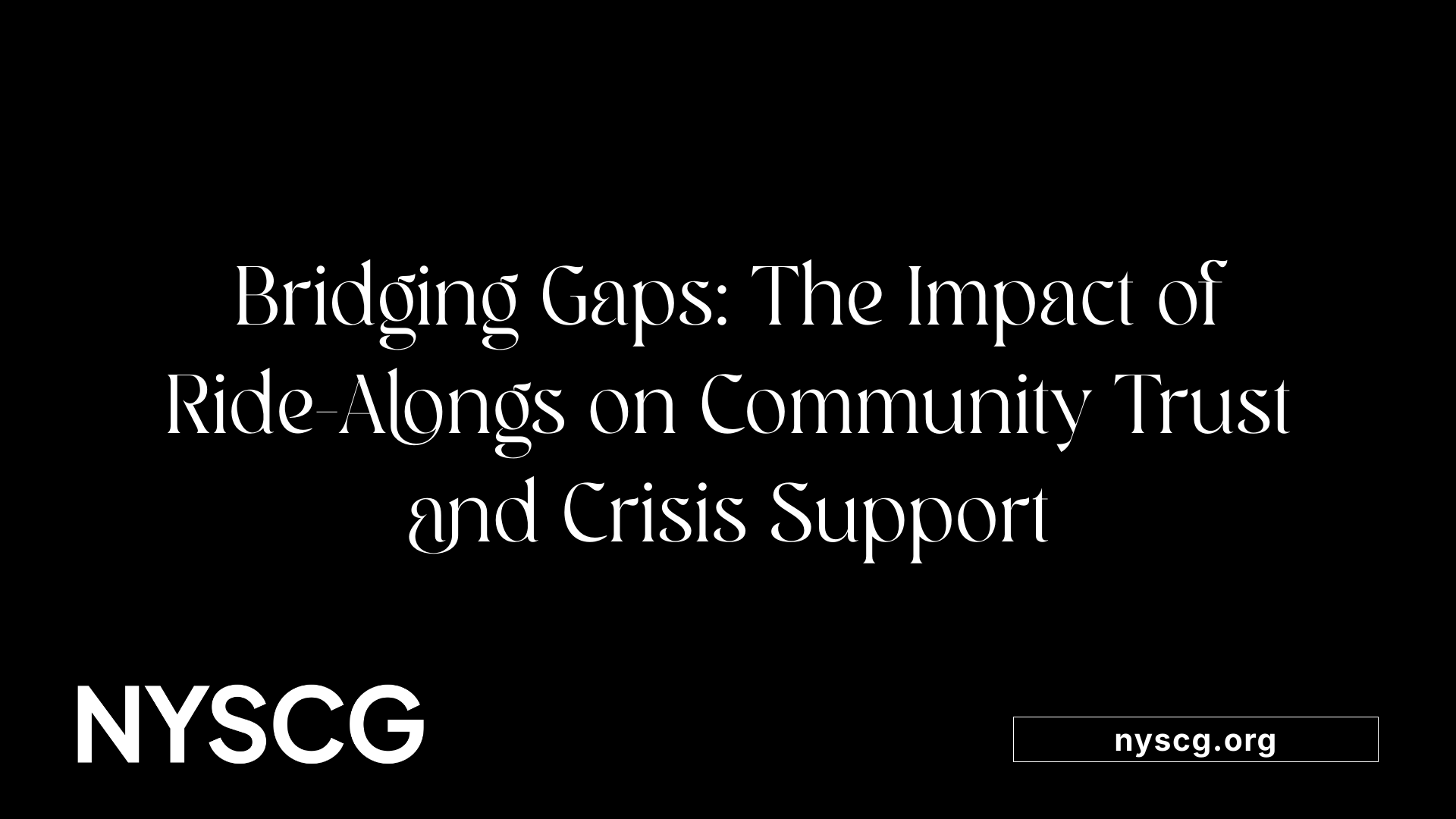Police Ride-Alongs: What Chaplains Experience on Duty


Police chaplains play a vital and multifaceted role in law enforcement, especially during ride-alongs, where they gain firsthand experience of police work and community interactions. Their presence provides emotional and spiritual support not only to officers but also to victims and their families during some of their most vulnerable moments. This article explores what police chaplains encounter during ride-alongs, their responsibilities, and the profound impact they have on both law enforcement personnel and the community.

Police chaplains serve as vital support figures during ride-alongs by providing a combination of spiritual guidance, emotional support, and crisis management. Their presence helps officers and community members navigate the emotional and psychological challenges encountered during police duties. During ride-alongs, chaplains often assist in critical incidents, such as suicide calls or tragic events, by offering comfort and explanations to victims and families.
A chaplain's role extends to supporting victims and their families through grief, offering counseling, and guiding them through notifications of deaths or injuries. For example, a police chaplain in Oconto County spent about six hours supporting a family after a suspected suicide, engaging in conversations, explaining police procedures, and advising on how to preserve memories.
Chaplains also actively work to build trust within the community through their visible supportive presence. They foster relationships with community members and facilitate partnership efforts that improve police-community relations.
Additionally, police chaplains participate in departmental ceremonies, memorial services, and community outreach events, demonstrating their commitment to officer well-being and community service. Their support during ride-alongs not only helps officers manage stress but also ensures emotional resilience during unpredictable and distressing situations.
In essence, the responsibilities of police chaplains during ride-alongs encompass providing emotional and spiritual support, assisting in victim and family care, and strengthening the bonds between law enforcement and the community, all while maintaining respectful boundaries and confidentiality.

During ride-alongs, police chaplains engage in a variety of supportive activities that help bridge the gap between law enforcement and the community. A primary role is providing emotional and spiritual support during intense or tragic incidents. For example, in a recent case, a chaplain assisted a family during a suspected suicide, staying with them for about six hours to offer comfort, facilitate understanding, and help process their last interactions with a loved one.
Chaplains observe police procedures and interactions firsthand, gaining insight into the complexities of law enforcement work. This understanding allows them to better support officers and the community during crises. They often respond to scenes involving accidents or emergencies, offering calming presence and counseling. Their involvement extends to explaining police steps to families, advising on how to handle sensitive moments, and supporting logistical needs such as transportation of deceased individuals.
In addition to scene support, chaplains participate in debriefings with officers and responders, providing emotional relief after stressful events. They may also perform duties like asking questions to help families and friends process their experiences and offering guidance on grief and memory preservation, such as advising against viewing bodies to protect loved ones’ mental health.
Overall, ride-alongs provide police chaplains an opportunity to be present during moments of crisis, offering reassurance, spiritual guidance, and a greater understanding of law enforcement challenges. Their presence not only supports individuals in distress but also helps foster trust and cooperation between police and the communities they serve.

Police chaplains who participate in ride-alongs with law enforcement officers engage in a variety of activities that help them understand the realities of police work while providing critical emotional support.
During these ride-alongs, chaplains observe police officers as they respond to various incidents, such as accidents, disturbances, or crimes. They witness department procedures firsthand and get a sense of the unpredictable nature of police duties.
In addition to observing police interactions, chaplains actively participate in department activities like roll calls, which prepare officers for their shifts and disseminate important information. They also often join community outreach events organized by the police, fostering better relationships between law enforcement and residents.
A significant part of their role involves providing emotional and spiritual support during crises. For example, they assist families during tragic events such as deaths, offering comfort and explanations of police procedures. They may stay with grieving families for hours, asking questions to help them process their last interactions with loved ones and advising on whether they should view the body to preserve memories.
Chaplains also support responders during difficult moments, helping manage emotions, de-escalate tensions, and facilitate funeral arrangements if necessary.
Overall, police chaplains during ride-alongs observe operational activities, participate in community and department events, and serve as compassionate supports during various critical incidents, helping officers and community members navigate difficult times.

During ride-alongs, police chaplains experience a range of emotional challenges as they witness the realities of law enforcement and respond to traumatic incidents. Being present at scenes such as suicides, violent crimes, or accidents exposes chaplains to intense emotional situations, which can evoke feelings of helplessness, grief, and stress.
The role of a chaplain involves offering immediate emotional support to victims, families, and officers. While fulfilling, this work can be overwhelming and may lead to emotional fatigue or burnout over time. Chaplains often provide comfort during tragic moments, but the continuous exposure to trauma requires resilience and effective coping strategies.
To address these emotional burdens, many chaplains use brief interventions like microcounseling and debriefing. These techniques help process feelings, promote emotional recovery, and prevent long-term mental health issues such as compassion fatigue or post-traumatic stress disorder (PTSD).
Support from mental health professionals and departmental resources is vital for chaplains to maintain their well-being. Regular debriefings, peer support, and self-care practices are essential components in helping chaplains manage the emotional toll of their service.
While the work is deeply meaningful, acknowledging and managing these emotional impacts is crucial to ensure chaplains can continue providing vital support without sacrificing their own mental health. Building systemic resilience and fostering open communication within departments contribute to sustaining the mental health of these essential caregivers.

Ride-alongs are an essential part of how police chaplains support their communities and law enforcement officers. By participating in ride-alongs, chaplains gain firsthand experience of police work, observing responses to various situations, from routine patrols to high-stress crises like accidents or traumatic events.
This direct exposure helps chaplains better understand the challenges officers face daily, including interactions with the public and handling emergencies. Such insight enables them to provide more precise emotional and spiritual support tailored to real-world circumstances.
Additionally, ride-alongs foster stronger relationships between police, chaplains, and community members. When chaplains are present during police activities, they build trust and rapport, which can be crucial during times of crisis. Community members see chaplains working alongside officers, which helps to ease tensions and promotes cooperation.
The experience also enhances the chaplains' ability to intervene effectively in crisis situations. Being present during incidents allows them to assess needs quickly, offer immediate comfort, and support families and responders.
Moreover, these ride-alongs deepen a chaplain’s understanding of community-police dynamics, helping them serve as better mediators and connectors. They become knowledgeable about community concerns, cultural sensitivities, and the realities of law enforcement work.
In summary, ride-alongs enrich a chaplain’s capacity to serve during emergencies, strengthen community bonds, and support officers in their demanding roles, ultimately contributing to more responsive and compassionate support during difficult times.
Police ride-alongs serve as a vital bridge between law enforcement and the communities they serve. For police chaplains, participating in these ride-alongs offers invaluable insights into police operations, enabling them to better support officers and victims during crises. Their role extends beyond spiritual guidance; they contribute to building trust, fostering community resilience, and ensuring that emotional and spiritual needs are addressed during some of the most challenging moments. As they observe, participate in, and support police activities, chaplains help create a more compassionate, understanding, and unified approach to community safety and well-being.
All you need is the will to make the world a better place.
New York State chaplain group inc. is a tax deductible organization with a federal tax Id number 92-383-4921